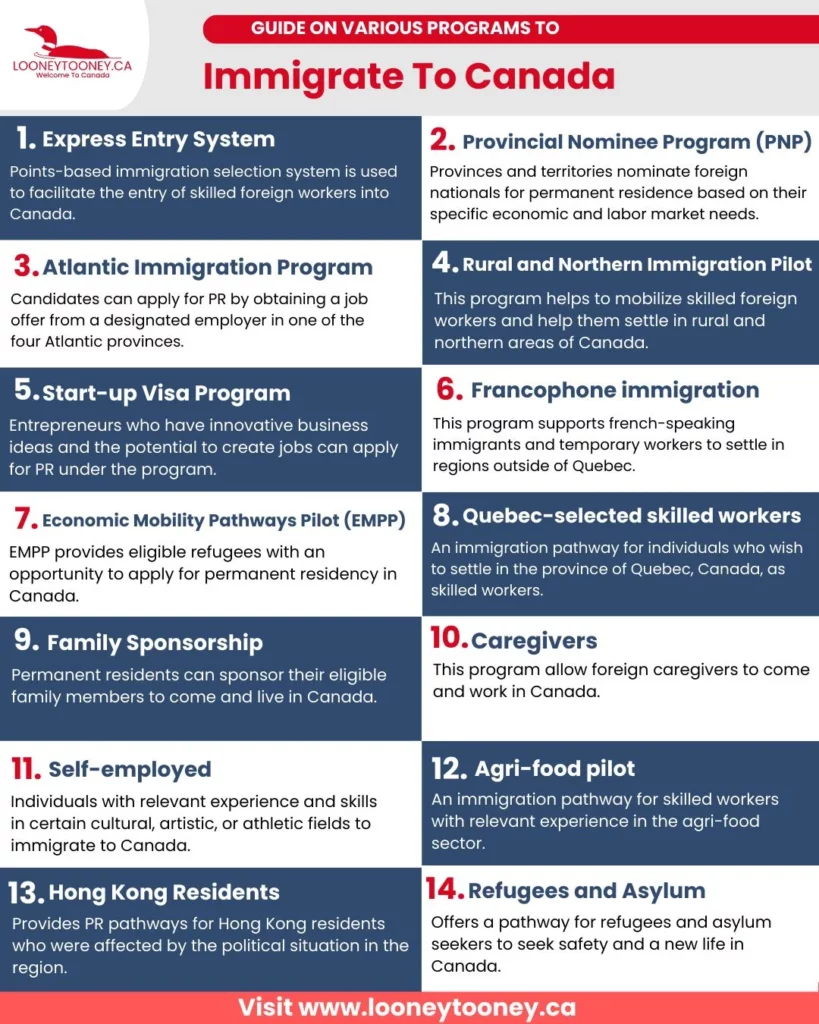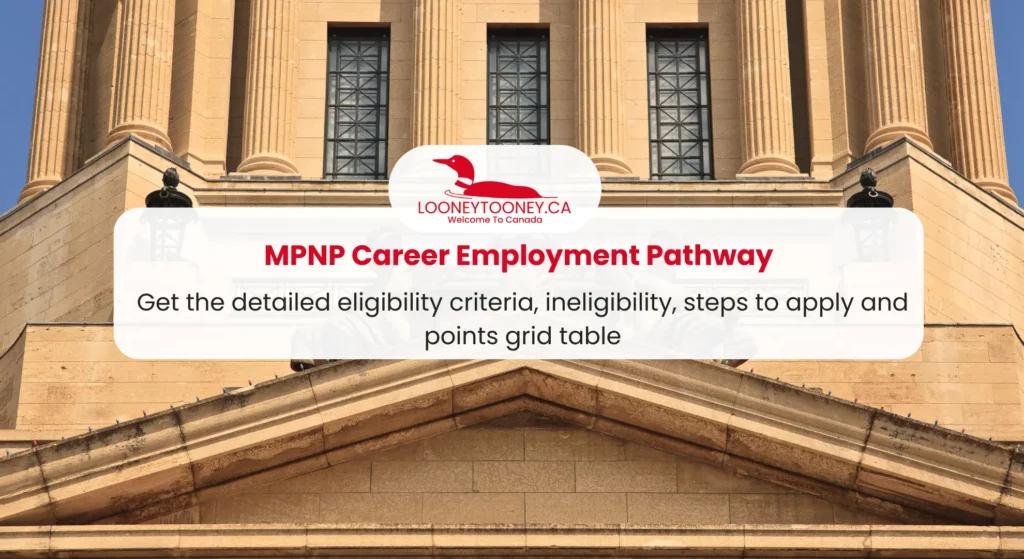We are glad that you have chosen to visit our website to learn more about Canadian immigration programs for permanent residency. We provide comprehensive guides and articles regarding all available programs to migrate to Canada permanently. All our guides are completely free and reviewed by a government-certified immigration consultant. They are also up to date as of the publishing date. We make our best efforts to provide you with the correct latest information, however, we can not be held liable for any inaccuracies.
If you would like to arrange a consultation for your specific case with our immigration consultant, that can be arranged for a fee.
A permanent residency allows individuals to reside, work, and pursue education in Canada without any time constraints. People with permanent residency status in Canada enjoy most of the rights and benefits that Canadian citizens do, with only a few exceptions.
Now, let us delve into the complex world of Canadian immigration starting with an infographic that gives a birds-eye view of the immigration program landscape.

1. Express Entry
Express Entry is Canada’s online system designed to manage applications for permanent residence from skilled workers. It serves as a gateway for skilled individuals worldwide to migrate to Canada under various federal economic immigration programs.
Programs under Express Entry
- Federal Skilled Worker Program (FSWP): Aimed at skilled professionals with foreign work experience who intend to reside in any province or territory outside Quebec.
- Federal Skilled Trades Program (FSTP): This is for skilled laborers aiming for permanent residency in Canada based on their proficiency in a particular trade.
- Provincial Nominee Program (PNP): This program lets provinces and territories endorse individuals who are keen on immigrating to Canada and have an inclination towards living in a specific province.
- Canadian Experience Class (CEC): For skilled workers who have Canadian work experience and want to become permanent residents.
Eligibility: To be considered for the Express Entry pool, candidates must
- Be eligible for one of the initiatives within Express Entry.
- Have at least one year of skilled work experience (specific to the program they’re applying under).
- Meet or exceed the language proficiency requirements in English or French.
- Have a Canadian educational credential or a foreign equivalent verified through an Educational Credential Assessment (for FSWP).
- Have relevant work experience in Canada (for CEC).
- Receive a nomination from a province (for PNP).
- Meet specific criteria based on the skilled trade (for FSTP).
2. Provincial Nominee Program (PNP)
The Provincial Nominee Program (PNP) is a significant component of Canada’s immigration policy. This program allows individual provinces and territories to select immigrants who meet their specific criteria and possess the skills, work experience, and education to contribute effectively to the local economy.
Eligibility: While the specific criteria can vary between provinces and territories, generally, to be eligible for the PNP, candidates must
- Have a job offer from an employer in the nominating province or territory.
- Have the necessary education, skills, and professional background to benefit the economy of the specified province or territory.
- Plan to live in the province or territory that nominates you.
- Meet the province or territory’s specific criteria as each has its own “streams” (immigration programs targeting certain groups).
Provinces and Territories Participating in PNP:
- Alberta
- British Columbia
- Manitoba
- New Brunswick
- Newfoundland and Labrador
- Northwest Territories
- Nova Scotia
- Ontario
- Prince Edward Island
- Saskatchewan
- Yukon
3. Startup Visa Program
The Startup Visa Program is a unique Canadian immigration pathway tailored for entrepreneurs with innovative business ideas. It aims to attract and retain talented entrepreneurs from around the world, facilitating their establishment of startups in Canada that are innovative, can create jobs for Canadians, and can compete on a global scale.
Canada recognizes the immense potential that foreign entrepreneurs bring to its economy. The Startup Visa Program is designed to tap into this potential by offering a direct route to permanent residency for entrepreneurs who can secure support from a designated entity in Canada, ensuring that the country benefits from its innovative skills and ideas.
Eligibility: To be considered for the Startup Visa Program, applicants must
- Possess a suitable business in which each participant has a minimum of 10% of the voting rights linked to all the existing shares of the corporation. Combined with the designated entity, they should hold over 50% of the overall voting rights.
- Obtain a letter of support from a designated entity (venture capital fund, angel investor group, or business incubator).
- Meet the language requirements in either English or French at a minimum Canadian Language Benchmark (CLB) level of 5.
- Demonstrate sufficient settlement funds to support themselves and their dependents upon arrival in Canada.
4. Quebec Immigration Program
The Quebec Immigration Program is a distinctive immigration pathway tailored for individuals who wish to settle in Quebec, a vibrant province in Canada with a unique French heritage.
Eligibility: To be considered for Quebec immigration, applicants must
- Intend to settle in Quebec and sign an agreement to live there.
- Meet the specific criteria of the program they apply to, which can vary based on whether they apply as skilled workers, businesspeople, students, or family members.
- Undergo a medical examination and security check.
- Demonstrate knowledge of French, given the province’s French-speaking majority. The level of knowledge required can vary based on the specific program.
Programs under Quebec Immigration: Quebec offers various immigration programs, each tailored for different types of applicants
- Quebec Skilled Worker Program
- Quebec Experience Program
- Quebec Business Immigration
- Quebec Family Class
- Quebec Refugee and Other Humanitarian Categories
5. Family Sponsorship Program
Canada’s Family Sponsorship Program is a testament to the country’s commitment to keeping families together. Through this program, Canadian citizens and permanent residents can sponsor their eligible relatives to come and live with them in Canada.
Eligibility for Sponsors: To be eligible to sponsor a family member, a person must
- Hold Canadian citizenship or possess permanent residency status.
- Be at least 18 years old.
- Reside in Canada.
- Sign an agreement stating that they will provide financial support for the relative and any accompanying family members.
- Proving they have sufficient income to provide for the basic needs of the sponsored family members.
Eligible Relatives for Sponsorship: Individuals who are Canadian citizens or hold permanent residency have the ability to sponsor these family relations
- Spouse, common-law partner, or conjugal partner.
- Dependent children.
- Parents or grandparents (through the Parent and Grandparent Program).
- Orphaned siblings, nephews, nieces, or grandchildren under 18 who aren’t married or in a relationship (some conditions apply).
- Any other relative, regardless of age, if the sponsor doesn’t have any of the above-mentioned relatives or family members (in specific situations).
6. Caregivers Immigration Program
Canada’s Caregivers Immigration Program is designed to address the nation’s need for caregivers, especially for those providing care to children, the elderly, or those with medical needs. Recognizing the invaluable contribution of caregivers to Canadian households, this program offers them a pathway to permanent residency.
Eligibility for Caregivers: To qualify for the Caregivers Immigration Program, applicants must
- Hold an authentic employment proposal from an employer in Canada.
- Meet the language and education requirements, typically equivalent to a Canadian high school diploma and a minimum language proficiency level.
- Have relevant work experience, usually a specified number of hours in caregiving roles within a certain timeframe.
Program Streams: The Caregivers Immigration Program comprises different streams tailored to specific caregiving roles
- Home Child Care Provider Pilot: For caregivers who provide childcare in a private residence.
- Home Support Worker Pilot: For caregivers assisting the elderly or those with medical needs in a private residence.
7. Self-Employed Immigration Program
The Self-Employed Immigration Program offers a pathway for individuals with experience in cultural activities, athletics, or farm management to settle in Canada. It’s designed for those aiming to become self-employed in these sectors within the country.
Eligibility for Self-Employed Persons: Applicants must
- Possess relevant experience in cultural activities, athletics, or farm management.
- Intend and demonstrate the capability to establish a business in Canada in the mentioned fields.
- Score at least 35 points on a selection grid evaluating age, education, experience, adaptability, and language skills.
8. Agri-Food Immigration Pilot in Canada
The Agri-Food Immigration Pilot is a unique pathway for foreign workers in the agri-food sector to achieve permanent residency in Canada. Recognizing the labor shortages in the agricultural sector, this pilot aims to retain experienced, non-seasonal workers who are crucial to the food production chain.
Eligibility for Agri-Food Immigration Pilot: To qualify, applicants must
- Have a full-time, non-seasonal job offer from a Canadian employer in the agri-food sector.
- Possess Canadian work experience in one of the eligible industries, such as meat processing, greenhouse crop production, or animal raising.
- Fulfill or surpass the linguistic criteria in English or French.
- Have a foreign equivalent of a Canadian high school education or higher.
- Prove they have enough funds to support themselves and their family members when settling in Canada unless they are already working in Canada.
9. Rural and Northern Immigration Pilot in Canada
The Rural and Northern Immigration Pilot is a community-driven immigration initiative tailored to address the specific labor shortages and economic needs of Canada’s rural and northern communities. This program aims to attract skilled workers to regions outside the major metropolitan areas, ensuring balanced population growth and sustained local economies.
Eligibility for Rural and Northern Immigration Pilot: To be considered, applicants must
- Have a referral from a participating community.
- Obtain a qualifying job offer for a full-time, permanent position in one of the participating communities.
- Meet or exceed the educational requirements, equivalent to a Canadian high school diploma or higher.
- Fulfill the necessary language benchmarks in English or French.
- Demonstrate they have sufficient funds to support their transition into the community.
- Intend to live in the recommended community.
10. Atlantic Immigration Program in Canada
The Atlantic Immigration Program (AIP) is a unique immigration pathway designed to address the specific labor market challenges faced by Canada’s Atlantic provinces: Newfoundland and Labrador, Prince Edward Island, Nova Scotia, and New Brunswick. Through AIP, these provinces can attract skilled workers and international graduates to fill job vacancies and contribute to local economic growth.
Eligibility for the Atlantic Immigration Program: To qualify for the AIP, applicants must
- Possess an employment proposal from an employer situated in one of the Atlantic regions.
- Meet the education, work experience, and language ability requirements of the job.
- Demonstrate they have sufficient funds to support themselves and their family when settling in the Atlantic region.
- Show an intention to reside in the Atlantic province where they have a job offer.
Program Streams: The AIP offers three distinct streams to cater to different applicant profiles
- Atlantic High-Skilled Program (AHSP): For candidates with a high-skilled job offer and at least one year of work experience in a skilled occupation.
- Atlantic Intermediate-Skilled Program (AISP): For those with a job offer needing high school education and specific job training.
- Atlantic International Graduate Program (AIGP): For international graduates from publicly-funded institutions in the Atlantic region.
11. Economic Mobility Pathways Pilot (EMPP) in Canada
The Economic Mobility Pathways Pilot (EMPP) is an innovative initiative by the Canadian government, that aims to recognize the skills and experience of refugees abroad. This program offers them an alternative pathway to come to Canada as skilled immigrants, rather than solely as refugees.
Eligibility for the Economic Mobility Pathways Pilot: To be considered under the EMPP, applicants must
- Be recognized as a refugee by either the United Nations Refugee Agency (UNHCR) or a foreign state.
- Reside outside of Canada.
- Meet the requirements of one of the three economic immigration programs under the Express Entry system: the Federal Skilled Worker Program, the Federal Skilled Trades Program, or the Canadian Experience Class.
- Meet or exceed the language requirements in either English or French.
- Have a valid job offer in Canada or be able to prove their ability to support themselves and their family once in Canada.
- Meet the education requirements, as determined by an Educational Credential Assessment.




